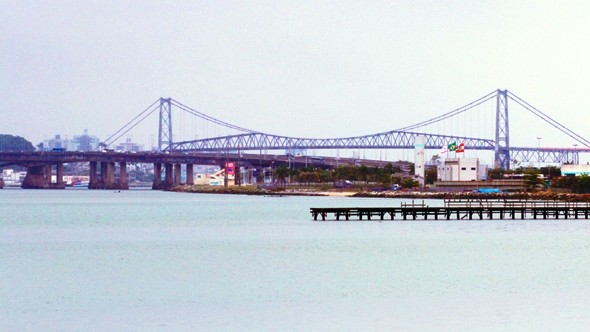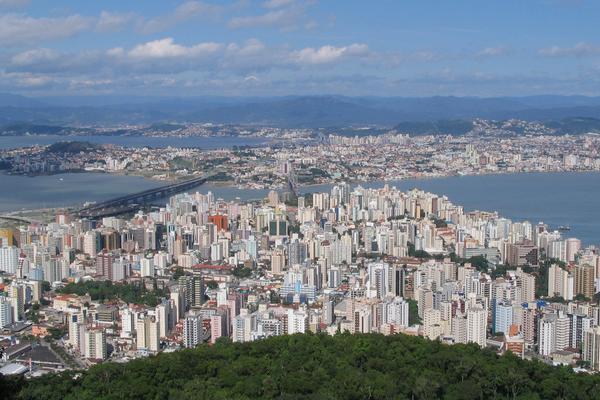Investments in Santa Catarina
Santa Catarina is a privileged land that combines quality of life and economic robustness. The State is full of opportunities, attracting high profile investors, in many different economic sectors.

Santa Catarina has characteristics and an atmosphere that are very favorable for business, very adequate infrastructures, and the best logistics. According to official data, the State also has the best indicators in terms of education, healthcare, and public safety.
You´ve probably popped a Sadia pizza hot pocket in the microwave without giving a second thought as to where it comes from, but if you looked closely at the packaging you´d see that it´s made by Brasil Foods S.A., and whilst the address may say Sao Paulo, Brasil Foods, hailed as one of the world´s largest food companies, has its roots firmly planted in the southern State of Santa Catarina, and like many companies hailing from Santa Catarina it has a romantic rags to riches story of European immigrants making it big in the new world.
Brasil Foods was formed in 2009 by the merger of two food companies, Perdigão and rival company Sadia, both of which were born in Santa Catarina. Perdigão started as a grocery store in Santa Catarina opened by two Italian immigrants, Saul Brandalise and Antonio Ponzoni, in 1934, who soon realized that they had landed in the right place, with their second store and then a farm following quickly on the back of their original shop. Sadia was also created in Santa Catarina in 1944 by another Italian, Attilio Fontana. It is said that he had just a small mill with a refrigerator that wasn´t even working properly, but almost immediately his return on investment allowed him to fix his fridge and within just 2 years he had his own factory and was slaughtering more than 100 pigs per day. Today, according to its own website, Brasil Foods is “one of the largest food companies in the world by market capitalization, leader in the global production of proteins… and the largest exporter of poultry meat”, with “60 plants throughout Brazil and 3 overseas (Argentina, the United Kingdom and the Netherlands) and also operates 24 overseas commercial offices and has a relationship with more than 5 thousand clients in 140 countries”.
Santa Catarina´s Governor, João Raimundo Colombo, attested to this interesting history of owner-operated businesses becoming hugely successful, saying “Our largest companies started out very small, in backyards, run by family members, and then grew to become huge corporations. We have hundreds of companies here that tell these extraordinary tales. WEG, for instance – WEG was created by a group of three friends, two of them of German origins, who knew how to build machines. Their company’s only asset was an old Volkswagen Beetle. They sold that asset and gained a little capital. Nowadays, they are a very large and solid company. So there are hundreds of companies like this, each with a different story, but all sharing a common origin.”
Like Perdigão, Sadia and WEG the State of Santa Catarina may be small, covering only “1% of Brazilian territory” according to its Foreign Affairs Office, but it is now ready to play a huge role on the international stage, with Governor Colombo explaining that whilst “people outside Brazil know São Paulo very well because of its dynamic economy and they know Rio de Janeiro because of its natural beauty and bustling tourism. Santa Catarina has both. We have a very strong industry and economy, that is just as dynamic as São Paulo´s; and we have the natural beauty of Rio de Janeiro, and as such many big players are starting to choose Santa Catarina instead of Sao Paulo.”
Earlier this year General Motors published a press release saying it “will invest R$710 million (U.S. $415 million) to build a new vehicle transmission plant” in Florianopolis, Santa Catarina. German car giant BMW has also just released “plans to build a factory in southern Brazil, a more than 200 million Euros investment expected to create 1,000 jobs.” Its Sales Director, Ian Robertson, said that “plans are for capacity of 30,000 vehicles a year, although production will depend on demand.” IBM has also announced the opening of a new branch in Joinville, Santa Catarina as it is “currently engaged in a geographic expansion program across Brazil aimed at tapping into high-growth cities and regions outside of the major urban centers of Rio de Janeiro and Sao Paulo.” In its press release IBM Brazil´s General Manager, Rodrigo Kede, said “Brazil is a key market for IBM and an important source of revenue and skills. However, the nature of the business landscape in Brazil is changing – we have noticed a marked shift with a growing number of technology adopters outside of major cities who are demanding access to intelligent solutions to grow their businesses”, highlighting that in “the Santa Catarina region to the south, Joinville has also experienced strong growth becoming an important industrial center.”
In 2009 Italy´s Azimut-Benetti Group opened “the largest covered boatyard in the world” according to charterworld.com in Itajai, Santa Catarina, its website states that a key factor in the decision to choose Santa Catarina was that “over the past 6 years, the State of Santa Catarina has seen the highest GDP growth rate in the whole of Brazil.”

So what has made this small, by Brazilian standards, State attract such high profile investors? In a recent interview Rodrigo Prisco Paraiso, Manager of the Foreign Affairs Office, explained that the State has many positives for the foreign investor, saying that in terms of logistics “Santa Catarina has a great geographical position as it is only 1 hour away by plane from Sao Paulo, Rio de Janeiro or Buenos Aires” and “there are five ports in Santa Catarina whereas Sao Paulo has only one.” In terms of industry “Santa Catarina has a very diverse economy with metal-mechanics in the northern parts, textiles more or less in the center and the technological industry in Florianopolis (the capital). Ceramics, agricultural, pork and poultry industries are also very strong in Santa Catarina.” When it comes to ease of doing business, Paraiso explained that Santa Catarina “has a northern European predominance” which has “helped to form a more bilingual population and therefore also a better educated workforce. This is an asset for the companies which are considering coming to Santa Catarina.” Moreover “the speed of starting up your business in Santa Catarina is also our asset as it will definitely take more time in other States.”
Governor Colombo, agreed saying “Santa Catarina has characteristics and an atmosphere that are very favorable for business, very adequate infrastructures, and it the best in the country in terms of logistics” adding that “according to official data, we have the best indicators in terms of education, healthcare, and public safety. So, our State is very dynamic, and, apart from all these benefits for business, we also have a differentiating policy of tax incentives.” Additionally, as Brazil is infamous for its bureaucracy, Colombo addressed this outlining one of the government´s policies being to “sensitize” or “to humanize the public administration machine so that it can overcome all the bureaucracy obstacles and address people’s problems quickly, efficiently and in a caring way.”
In order to increase investment in Santa Catarina the government has set up programs such as Prodec, the Program for Development of Santa Catarina Businesses, the purpose of which, according to the government´s website, “is to offer tax incentives for the setting up or expansion of industrial and agri-business enterprises which will generate jobs and income in Santa Catarina. It is the delaying of total or partial payment of ICMS (Goods and Services Circulation Tax) to be generated by the entrepreneur.”
So as investing becomes easier no doubt other big international companies will follow in GM and BMW´s footsteps whilst smaller entrepreneurs can follow in those left by the likes of Attilio Fontana, Saul Brandalise and Antonio Ponzoni with Guilherme Bez Marques, Manager of the Department for International Economics at the Foreign Affairs Office (Santa Catarina) summing up his State´s business and humanist ethos saying “here in Santa Catarina, we are trying to make everything work. If people want something, they will achieve it. Here, we are looking for a better place to live, a better place to work and a better place for our children.”